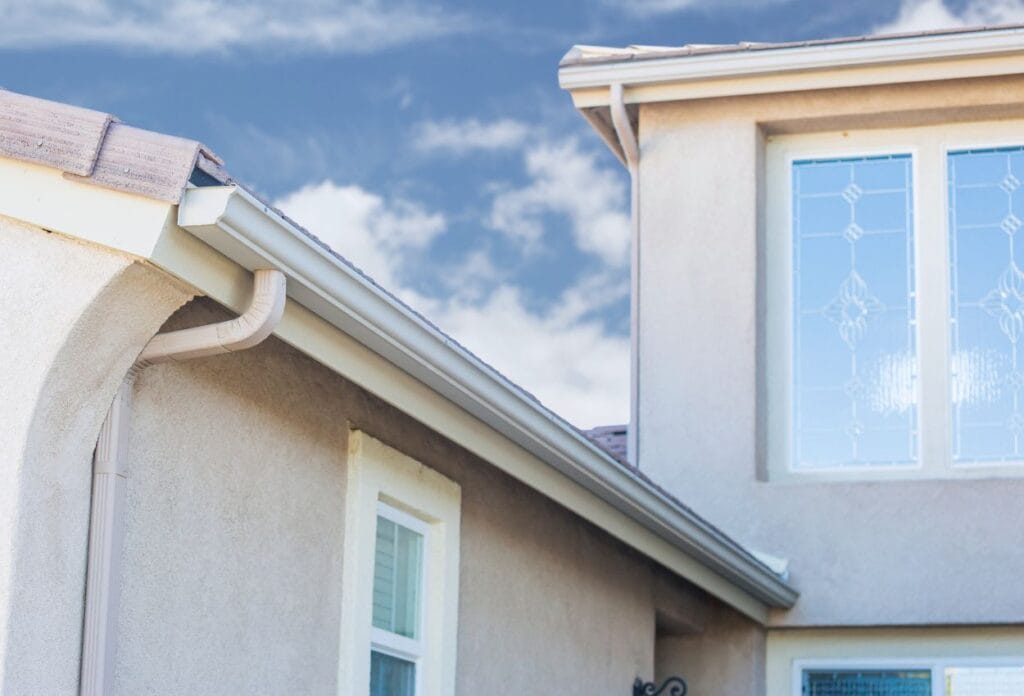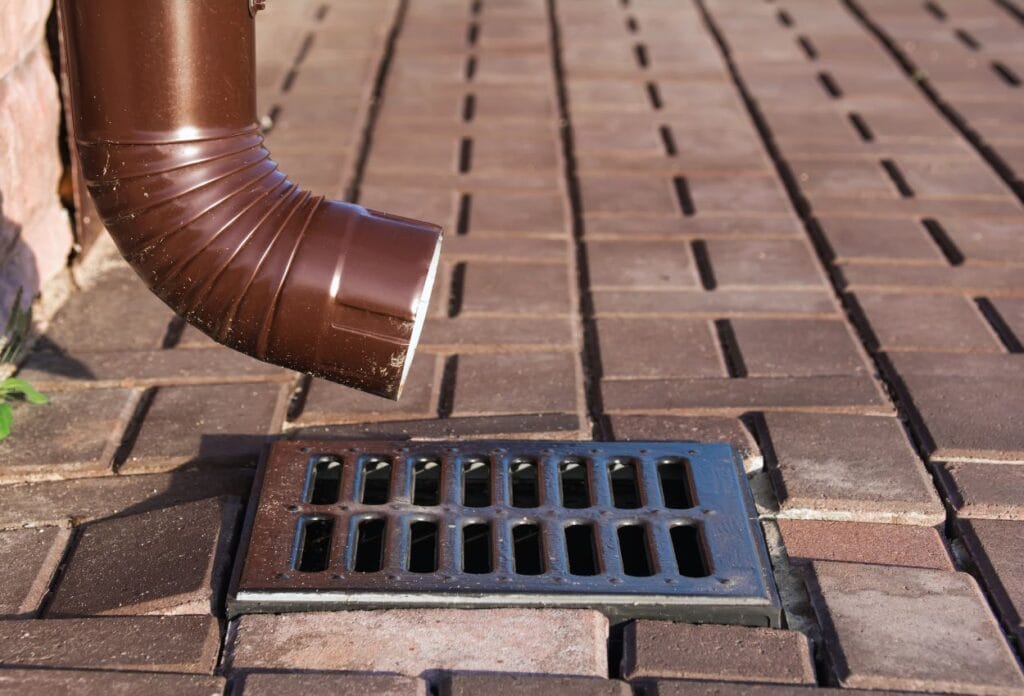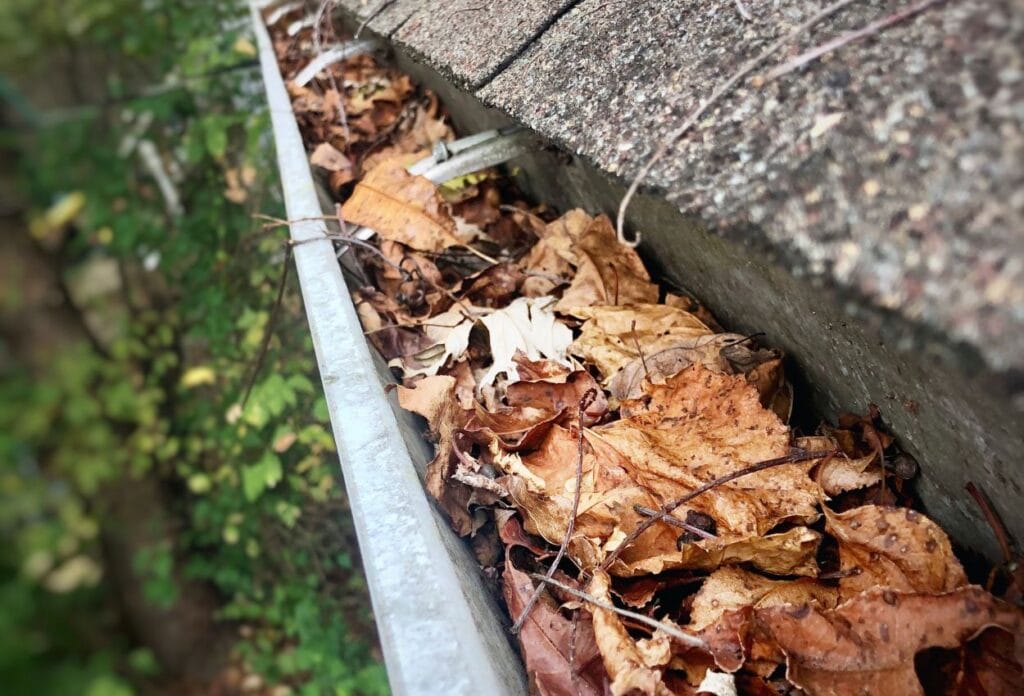Even though gutters and downspouts may not stand out, they play a crucial role in protecting your home. Without proper care, they can lead to serious problems like foundation damage, basement flooding, and exterior wear.
In this post, we’ll dive into why gutters and downspouts matter and how they help keep your home safe and sound.
What Are Gutters?

As an essential part of a building’s water management system, gutters collect and direct rainwater away from the roof, walls, and foundation. Installed along roof edges, they channel water through downspouts, preventing issues like stains, erosion, and structural damage.
By guiding water safely away, gutters help protect against foundation problems, water damage, and mold growth caused by excess moisture. They come in various types, including K-style, seamless, box-style, and half-round, and are made from materials like vinyl, aluminum, steel, and copper to suit different architectural styles and climates.
What Are Downspouts?

Another essential part of a building’s rainwater drainage system, a downspout, directs water from the gutters to the ground, preventing damage to the roof, walls, and foundation. Typically installed at the corners, it ensures smooth water flow, reducing the risk of erosion, structural issues, and water pooling. Many downspouts are designed with extensions or splash blocks to divert water safely away from the foundation, helping to protect the building’s integrity and maintain stable soil around it.
How Do Gutters And Downspouts Work Together?
The process starts as rainwater lands on the roof and flows into the gutters, which collect and channel it toward the downspouts. These vertical pipes then guide the water safely to the ground, directing it away from the foundation to prevent pooling and structural damage. By maintaining proper drainage, this system helps protect the home from water-related issues.
Is It Possible For Gutters To Work Without Downspouts?
Gutters can function without downspouts, but it’s not a good idea. Without downspouts to direct water away, rainwater can overflow, leading to foundation damage, siding issues, and landscape erosion. Excess moisture can also build up around the home, increasing the risk of water-related problems over time.
What Is The Importance of Gutters and Downspouts?
Gutters and downspouts protect your home in many ways — let’s go over their key benefits:
1. Extends Roof Lifespan
Gutters prevent water from pooling on the roof or seeping under shingles, which can lead to mold, rot, and structural damage. By keeping them clear and in good condition, you help protect your roof and extend its lifespan.
2. Protects the Foundation
Without proper drainage, rainwater can accumulate around the foundation, causing cracks, shifting, and erosion. Gutters and downspouts direct water away, preserving the stability of your home and preventing expensive structural repairs.
3. Prevents Siding Damage
Not having gutters allows water to run down exterior walls, leading to mold, mildew, and deterioration, especially in wood or stone siding. A well-maintained system ensures water flows away and keeps your home’s exterior intact and looking its best.
4. Reduces the Risk of Basement Flooding
By guiding water away from the house, gutters prevent it from seeping into basements or crawl spaces. This is especially crucial in areas prone to heavy rainfall, where standing water can lead to moisture buildup and mold growth indoors.
5. Minimizes Repair Costs
Water damage to roofs, foundations, siding, and landscaping can be expensive. Investing in a well-maintained gutter system helps prevent these issues, saving homeowners from pricy repairs in the long run.
6. Keeps Pests Away
Without gutters, water may pool on the roof, attracting mosquitoes, rodents, and other pests. Clear gutters and downspouts prevent infestations, contributing to a healthier and more comfortable home environment.
7. Enhances Curb Appeal
Clean, functional gutters improve the overall appearance of a home. Unregulated rainwater can cause stains on siding and fascia, lowering a property’s visual appeal and value.
8. Ensures Safe Walkways
Overflowing water can create slippery surfaces near entryways and sidewalks. A proper drainage system helps keep these areas dry and safe for residents and visitors.
9. Meets Local Building Codes
Many areas require homes to have effective drainage systems to prevent flooding and erosion. A properly installed gutter system ensures compliance with regulations and helps homeowners avoid fines or legal issues.
10. Supports Sustainable Water Management
Gutters help control stormwater runoff, reducing urban flooding and allowing homeowners to collect rainwater for reuse. This eco-friendly approach benefits both the home and the environment.
Consequences of Poor Gutter and Downspout Maintenance
Ignoring gutters can lead to serious problems — here’s what can happen without proper upkeep:
1. Roof Damage
Clogged gutters cause water to back up onto the roof, leading to leaks, rot, and mold growth. Over time, this weakens the structure and results in costly repairs.
2. Foundation Problems
When water overflows and pools around the foundation, it can cause cracks, soil erosion, and even foundation settling — issues that are expensive to fix.
3. Siding & Fascia Board Damage
Overflowing gutters can cause water to soak into wooden siding and fascia boards, leading to rot, weakening, and reduced curb appeal.
4. Mold & Mildew Growth
Wet conditions from blocked gutters promote mold and mildew, which can spread and affect indoor air quality.
5. Gutter Deterioration
Neglected gutters wear out faster, leading to rust, sagging, and eventual failure, requiring a full replacement.
6. Sagging Downspouts
Downspouts should direct water away from the home. If they’re detached or sagging, water can seep into walls and the roof edge.
Maintenance Tips for Gutters and Downspouts
Keeping gutters in good shape is simple with regular maintenance. Below are some key tips:
1. Clean Your Gutters Regularly

Remove leaves and debris every few months to keep water flowing properly. After clearing out the buildup, flush the gutters with a hose to check for clogs. The best times to clean are late spring and fall when debris is most common.
2. Check Downspouts for Clogs
Blocked downspouts prevent water from draining properly. Use a garden hose with a pressure nozzle to clear out any buildup from leaves or twigs. This helps direct water away from your home.
3. Fix Minor Damage Early
Look for rust, cracks, or sagging sections in your gutters. Small cracks can be sealed with gutter sealant, but major damage may require professional repairs or replacements.
4. Use Gutter Guards
Installing gutter guards reduces the need for frequent cleaning by blocking leaves and debris. They also help keep pests from nesting inside your gutters.
5. Add Downspout Extensions
Downspout extensions help direct water further away from your home’s foundation, preventing pooling and potential structural damage over time.
Protect Your Home with Renova Roofing & Construction’s Gutter Services
Now you know the role gutters and downspouts play in protecting your home from water damage. If you want to keep them working properly, regular maintenance and repairs are essential. A well-maintained gutter system helps safeguard your home, maintain its value, and give you peace of mind.
Taking care of your home from water damage starts with a dependable gutter system. At Renova Roofing & Construction, we provide expert gutter services to keep your home safe and secure. Whether you need a thorough inspection or a complete installation, our skilled team delivers the best services with quality craftsmanship. Trust us to keep your gutters in peak condition. Call us at (601) 647-3433 today!

